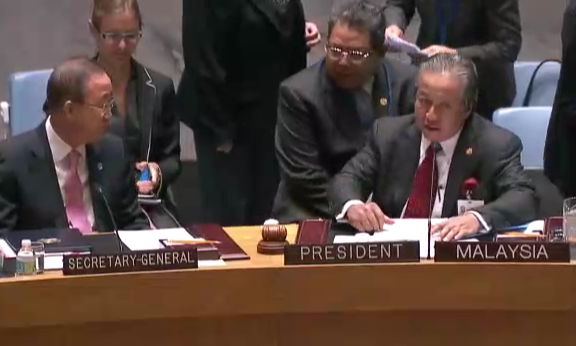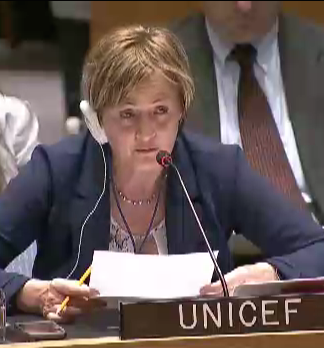On 18 June 2015 the UN Security Council held an open debate on children and armed conflict, chaired by Malaysia. In the context of growing international engagement with the humanitarian problem of the use of explosive weapons in populated areas, a number of states as well as UNICEF used their statements to highlight the impact of explosive in populated areas, and the need for international action to address this issue.

Malaysia, chair of the debate, with the UN Secretary-General (UN Web TV)
Austria reminded states at the debate that it will be hosting a meeting in Vienna on 21 and 22 September on this issue, welcoming “the Secretary-General’s recommendation to avoid the use of explosive weapons with wide-area effects in populated areas and the Secretariat’s efforts to develop practical measures and guidance to reduce their humanitarian impact”. Austria commended the UN Secretariat for their efforts to raise awareness about the “devastating humanitarian consequences of explosive weapons for civilians, including children, and to restrict their use in populated areas where they cause indiscriminate harm”. Austria also highlighted the UN Secretary-General’s initiative to research current national practices with regard to explosive weapons, encouraging others to contribute.
Belgium reiterated its concerns about the use of explosive weapons in populated areas, calling on “all parties to armed conflict to renounce their use”. In a joint statement delivered by Sweden, Finland, Iceland, Sweden and Norway also expressed concern at the “severe impact on children” and that these countries would “support practical steps to stop it”.

UNICEF’s representative delivers the agency’s statement to the debate (UN Web TV)
Guatemala condemned “the use of explosive weapons in densely populated urban areas, because this increases the vulnerability of children, resulting in an increased number of deaths and incidents of mutilation, as well as prolonged suffering, destruction and chaos.” Malaysia reminded the debate that in various countries across the world “children are losing their lives as the result of air strikes and the use of explosive weapons in densely populated settings”. UNICEF highlighted the continued use of explosive weapons in populated areas as an ongoing threat to children. Argentina and Spain also noted the devastating effects on children and the child victims that result from the use of explosive weapons around the world.
In advance of the debate, INEW distributed a briefing paper calling on states to take the opportunity of the debate to address the humanitarian impact of explosive weapons in populated areas, and support the development of an international commitment to stop the use in populated areas of explosive weapons with wide area effects. Such a commitment, building on existing law, would help to strengthen the protection of civilians in armed conflict. All states should support the development of an international commitment and work constructively towards it. States should take the opportunity of September’s meeting in Vienna to commence discussions towards its development and implementation.
Read more
INEW briefing paper distributed ahead of the debate
A Commitment to Act: New INEW Briefing Booklet
Achieving a political commitment on explosive weapons: new HRW/Harvard report explores options
States and others that have acknowledged the problem and called for action
Casualties from explosive violence increased again in 2014: new AOAV report
